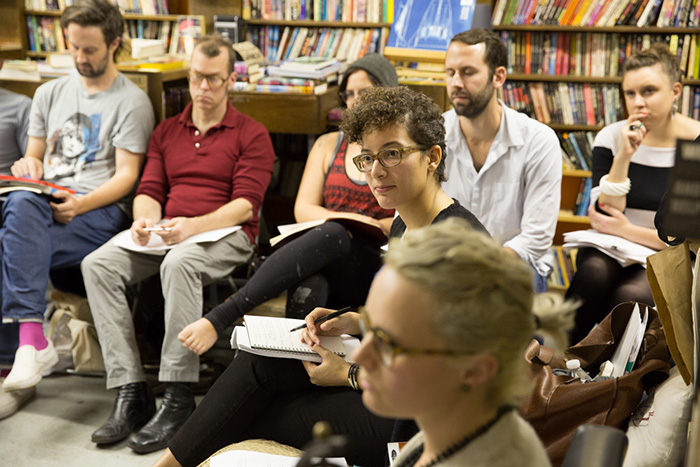NYC institute builds community with liberal arts courses
By Daniel Aloi

Across New York City, curious and motivated people from all walks of life are learning in-depth about Freud, Plato, urban design, technology studies, and other humanities and social sciences topics.
The nonprofit Brooklyn Institute for Social Research (BISR), co-founded in 2012 by Ajay Chaudhary ’03, offers deep subject matter outside of traditional institutional walls, giving the local community access to liberal-arts education.
Intensive and informal, graduate seminar-styled classes often meet in neighborhood bars, restaurants and bookstores, and represent “a shift beyond the university, to critically engaged learning interwoven into the lives of working adults,” Chaudhary says.
“In New York City, some people are really atomized from each other,” he says. What BISR offers is partly “integration, socialization and community-building … but it’s also bridging and connecting academic work” for young faculty scholars.
Over the past year, more than 1,000 people enrolled in 64 BISR courses. Some never finished college; some hold doctorates. “Most of our students are between the ages of 25 and 55, all coming together from an incredibly diverse range of backgrounds and professions, to study and learn together,” Chaudhary says.
Danya Glabau ’07, M.A. ’14, Ph.D. ’16, calls it “community-level scholarship.” Her class in urban infrastructure and design last year drew professionals interested in building better cities. Her current students include “science journalists, artists, practicing scientists and doctors” for a course on Donna Haraway, a scholar of “the role science and technology plays in our lives and the possibility for building a better society.”
“I’m really excited as a recent graduate of Cornell to find the space to teach in a way that takes my work in new directions and takes it out of the ivory tower, and to reach communities who are interested,” Glabau says. “As a young scholar, it’s exciting to teach the kind of material you’re really passionate about. It’s really been a one-of-a-kind opportunity for me.”
The institute was hatched while Chaudhary was a doctoral candidate teaching in Columbia University’s Core Curriculum. “I would prepare a lot of my classes at a local bar, and I noticed a lot of community interest in what we were teaching,” he says. “This was while Occupy [Wall Street] and other political things were happening – people were thinking of new institutions that could be built and that they could be a part of.”
The BISR curriculum ranges from classics and literature to natural science, philosophy, critical theory, art, politics, history and anthropology. Chaudhary has taught introductions to Plato and Marx, among others; and courses on Walter Benjamin’s Arcades Project and on economy, technology and human survivability.

“The way we design courses is one of our foundational ideas,” he says. “On one level, we’re building what we think is a more dynamic version of core curriculum. When you’re teaching this kind of material or your research in a social base, it changes the way you think about and teach this subject.”
Most of the four-week courses meet for three hours once a week. Between classes, students connect on email and social media and do up to 100 pages of reading.
“Part of what makes it fun as an instructor is really thinking about how to focus the courses, as a strategy, and to dig into a topic in detail,” Glabau says.
“In one course we just read Spinoza’s ‘Ethics’ cover-to-cover,” Chaudhary says. “It was such a joy to teach a group that was so into doing it, and wanted to dig into what this book was actually saying.”
BISR also offers a podcast series and public events, such as a scholarly panel discussing masculinity, religion and gun violence after the June 12 mass shooting in Orlando. A Community Initiative to offer free educational opportunities to the city’s most underserved citizens launched recently with a five-week seminar on James Baldwin, in partnership with the housing organization Breaking Ground. BISR raised funds for the ongoing initiative, matching a $5,000 New York Council for the Humanities Action Grant.
“We are part of the cultural and scholarly landscape here in New York and hope to be in several other cities as well,” Chaudhary says. “There needs to be a home for the kind of scholarship we nourish through our community. There needs to be more than just a university. There’s all kinds of work to be done.”
Media Contact
Get Cornell news delivered right to your inbox.
Subscribe